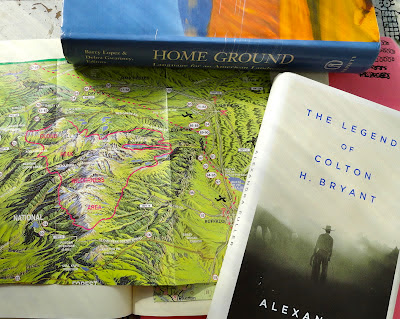Prairie Center: In Praise of Senses
With a draft of the Texas essay behind me and the end of my time at Prairie Center on the horizon, it’s easy to get sidetracked in the studio. I feel torn in multiple directions–pushing to get one more draft complete, preparing for summer classes at Interlochen, and growing my Writer at Large business. (Today’s productive procrastination? Three submissions to first book prizes, one submission to a literary magazine, and a little browsing at Sierra Club backpacking trips to the Arctic, among other tasks.)
Days like that, it’s really just about tricking the brain into action. In
order to write about place, I need to read about place. I know that much. (Hence the amazing Alexandra Fuller book pictured above.) But what I’m also discovering about my process (which is so much slower than writing the war stories) is that I need to ponder and look, and if I can make this experience somehow tactile–all the better.
order to write about place, I need to read about place. I know that much. (Hence the amazing Alexandra Fuller book pictured above.) But what I’m also discovering about my process (which is so much slower than writing the war stories) is that I need to ponder and look, and if I can make this experience somehow tactile–all the better.
When I “warm up” for generating new material on the Wyoming essay, I look at photos I took while at Jentel, thumb through my scrapbook to study old maps, and review definitions of landscape terms in Home Ground. Even the simple act of pausing to stare at a photo (sense of sight), un-creasing the folds in an old map (sense of touch), questioning the connections on my bulletin board map (sense of wonder), and studying the story of specific words (sense of history/time) engages me on enough levels that before I know it, I’m jotting down new ideas in my journal. Inevitably, the free-writing leads me to the keyboard and with all that momentum going, I’m just about always able to create something new.
Engaging the senses for inspiration seems as obvious to me now as the age-old writing advice, “Use the five senses!” But even those things we teach, we sometimes need reminding of ourselves. Furthermore, aren’t there more than five senses? We’re writers! We can make up new senses till the corn is high. That’s why sense of wonder counts. That’s why sense of history counts as well–because what is history other than a story? And so you see how one thing leads to another, and before you know it, just about anyone can bring an ordinary idea into the realm of the extraordinary.
Comments



Yes, sense of place and time. You mention Wyoming and I can tell you a story. That would expose some history and… oh dear, I probably should write it!